Related Research Articles

Sheffield Wednesday Football Club is a professional association football club based in Sheffield, South Yorkshire, England, that will compete in the EFL Championship, the second tier of English football, following promotion from the 2022–23 EFL League One. Formed in 1867 as an offshoot of The Wednesday Cricket Club, they were known as The Wednesday Football Club until 1929.

Sheffield United Football Club is a professional football club in Sheffield, South Yorkshire, England, that competes in the Premier League, following their promotion from the 2022–23 EFL Championship. They are nicknamed "the Blades" due to Sheffield's history of cutlery production. The team have played home games at Bramall Lane since their formation. For most of the club's history, United have played in red and white striped shirts with black shorts. Their main rivals are Sheffield Wednesday, with whom they contest the Steel City derby.
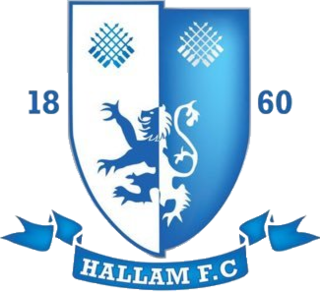
Hallam Football Club is an English football club based in Crosspool, Sheffield, South Yorkshire. Founded in 1860, Hallam is the second oldest association football club in the world. Hallam have played at their Sandygate home in the Sheffield suburb of Crosspool since formation, with the ground being officially recognised by the Guinness Book of Records as "The Oldest Football Ground in the World". In 1867, the club made history by winning the world's first ever football tournament, the Youdan Cup.
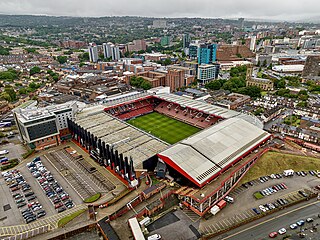
Bramall Lane is a football stadium in Sheffield, South Yorkshire, England, which is the home of Sheffield United.
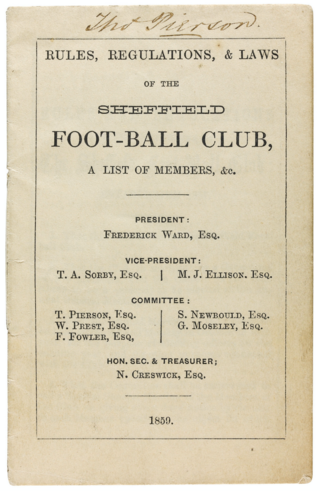
The Sheffield Rules was a code of football devised and played in the English city of Sheffield between 1858 and 1877. The rules were initially created and revised by Sheffield Football Club, with responsibility for the laws passing to the Sheffield Football Association upon that body's creation in 1867. The rules spread beyond the city boundaries to other clubs and associations in the north and midlands of England, making them one of the most popular forms of football during the 1860s and 1870s.

The Steel City Derby is a local derby that takes place between Sheffield United and Sheffield Wednesday, the two professional football league teams based in the city of Sheffield, England. It is widely considered to be one of the biggest derby matches in English football.

Alan Hodgkinson MBE was an English professional football goalkeeper and goalkeeping coach.
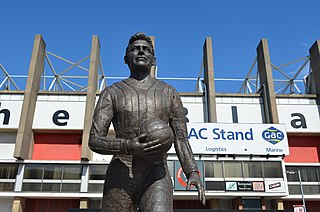
Joseph Shaw was an English footballer who played for Sheffield United between 1945 and 1966. He also worked as a manager, being in charge of York City from 1967 to 1968 and Chesterfield from 1973 to 1976.
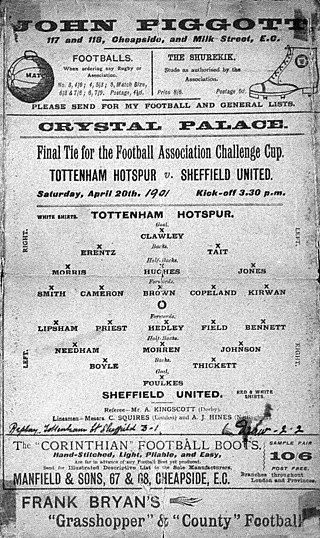
The 1901 FA Cup final was an association football match between Sheffield United and Tottenham Hotspur on Saturday, 20 April 1901 at the Crystal Palace stadium in south London. It was the final match of the 1900–01 FA Cup, the 30th edition of the world's oldest football knockout competition, and England's primary cup competition, the Football Association Challenge Cup, better known as the FA Cup.

The 1915 FA Cup final took place on 24 April 1915 and was contested by Sheffield United and Chelsea. It was the last FA Cup final to be staged before competitive football was suspended in Britain because of the First World War. The match was moved from its pre-war location of Crystal Palace in south London to Old Trafford in Manchester to avoid disruption to travel in and around London.

The 1925 FA Cup final was an association football match contested by Sheffield United and Cardiff City on 25 April 1925 at Wembley Stadium in London, England. The final was the showpiece match of English football's primary cup competition, the Football Association Challenge Cup, organised by the Football Association. Sheffield United won the game with a single goal.

The Sheffield & Hallamshire Senior Cup is a county cup competition involving teams within the Sheffield and Hallamshire County Football Association. Originally named the Sheffield Challenge Cup, it is the 5th oldest surviving cup competition in the world, after the FA Cup (1871–72), the Scottish FA Cup (1873–74), the East of Scotland Shield (1875–76) and the Birmingham Senior Cup (1876-77).
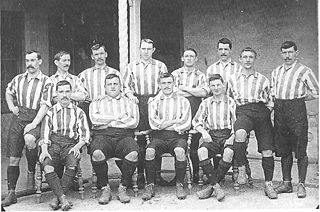
Henry Thickitt was a professional footballer and Manager. Born in Hexthorpe, Doncaster he played as a defender primarily for Sheffield United with whom he won the First Division once, the FA Cup twice and gained two caps for England. He then went on to achieve relative success as the manager of Bristol City.
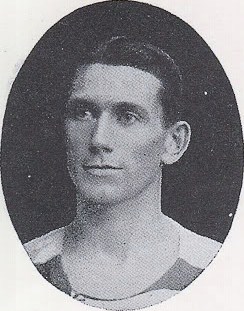
Billy Barnes was a professional footballer from West Ham, Essex. Originally debuting for Thames Ironworks, he moved to Sheffield United and scored the winning goal in the 1902 FA Cup final replay. Later on in his career he won two Southern Football League titles and took part in two Charity Shield matches including the first time it was held. Once his playing career was over, he went on to manage Athletic Bilbao in Spain.
Attercliffe Football Club was an English association football club based in Attercliffe, Sheffield, South Yorkshire.

The 1908 FA Charity Shield was the first Charity Shield, a football match contested by the winners of the previous season's Football League and Southern League competitions. It was intended as a replacement for the Sheriff of London Charity Shield, after The Football Association declined to provide a professional club to the organisers of that event for the annual amateurs vs. professionals match. The new match was subsequently arranged to take place at Chelsea F.C.'s home ground, Stamford Bridge. Following the conclusion of the respective leagues, 1907–08 Football League winners Manchester United were scheduled to play against 1907–08 Southern League champions Queens Park Rangers.
The 1992–93 FA Cup was the 112th season of the FA Cup, also known as The Football Association Challenge Cup. It was won by Arsenal, who beat Sheffield Wednesday 2–1 in the replay after a 1–1 draw in the final at the old Wembley Stadium. The goals were scored by Ian Wright and Andy Linighan, who scored in the 119th minute. This was the last FA Cup final to be decided by a replay before final replays were abolished in 1999.
Edward W. Powell was an English amateur footballer who went on to coach the Malawi national team and the England Under-18 side which won the European Championship in 1993. Powell was a teacher at Sutton Grammar School in the late 1960s and early 1970s when he played amateur football for Sutton United.
The 1889–90 season was the first in existence for Sheffield United. Having not been elected to any organised league at that point they predominantly played friendly fixtures but did enter the FA Cup for the first time as well as locally arranged cup competitions The Sheffield Challenge Cup and the Wharncliffe Charity Cup. The club did not employ a manager in this period; tactics and team selection were decided by The Football Committee and the players were coached by a trainer. J.B. Wostinholm held the position of club secretary, dealing with player transfers and contracts, arranging matches and dealing with the FA. The first season was deemed a reasonable success with steady attendances to home games and progress in the FA Cup although the fluctuating nature of the team meant that consistency was never really achieved.
Tom Johnson was an English footballer who played as a defender. He made over 250 appearances for Sheffield United, the club which his father and brother also played for.
